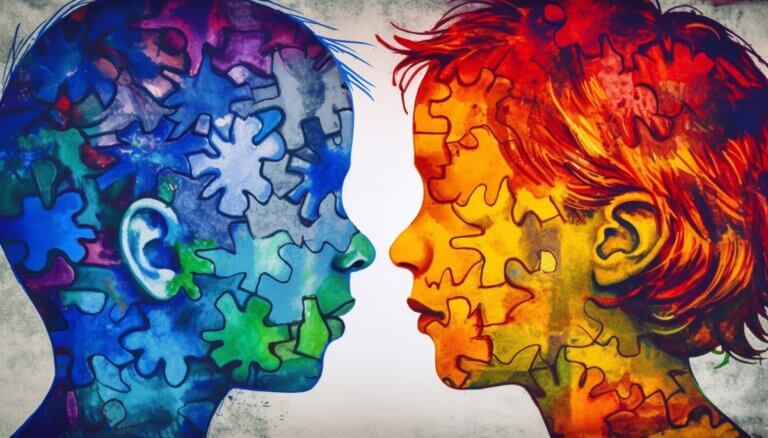Table of Contents
The Fundamentals of Emotional Intelligence

Recognizing Self-Perception and Emotions
Emotional intelligence lays the foundation for a profound understanding of our own emotions and those of the people around us. At the heart of the concept of emotional intelligence is self-awareness, which is the ability to recognize and appropriately classify one’s own emotions. This influences how we think, decide, and act.
Emotional skills like self-awareness are not just private matters. They play a central role in the professional context. For example, if a manager notices that he reacts irritably under pressure, he can use this insight to adjust his behavior and thus avoid conflicts in the team. A solid foundation in emotional intelligence helps us use our own emotions as guides rather than as uncontrollable forces.
The Role of Self-Awareness
Self-awareness is the recognition and understanding of one’s own emotions in real time. A clear example of this is a project manager who feels impatient because a team member is not meeting a deadline. Reflecting on his impatience leads to the awareness that it arises from concern about the project’s progress and not from anger at the person themselves.
With a good introduction to emotional intelligence, it is possible to understand such mechanisms and react appropriately. So, instead of blaming the team member, the project manager takes the opportunity for a constructive conversation to look for solutions and support the team member.
Practical Implementation in Everyday Work
The ability to perceive emotions in oneself and others early on can improve collaboration and contribute to positive work relationships. Basics of emotional intelligence teach how mindfulness can develop a higher sensitivity to interpersonal dynamics. A team leader who notices that the team’s mood is declining can intervene early and, for example, initiate team-building measures to counteract this.
The basis of these skills is the awareness of one’s own inner emotional world and its influence on our interactions. The ability to self-reflect enables us to interpret emotions like frustration not as uncontrollable outbursts, but as signals that inform us about our values and needs.
Implementing emotional intelligence in practice requires learning to listen to our emotions, accepting them, and acting in a way that aligns with our own intentions and goals. This not only strengthens personal well-being but also contributes to the development of a healthy and constructive work environment.
Self-regulation and Emotional Self-Control
Emotional Intelligence Basic Knowledge comprises a spectrum of skills that significantly shape our social functioning and interactions. Among these skills, self-regulation, also known as emotional self-control, is a key component. It is a process where individuals consciously manage their emotions and reactions to achieve higher harmony in personal and professional life.
Foundations of Emotional Intelligence and Self-Regulation
The introduction to Emotional Intelligence suggests that the concept of Emotional Intelligence is a fundamental basis for success and satisfaction. For instance, a person who can control their frustration in heated meetings can create a more constructive environment and communicate more effectively. This illustrates the importance of self-regulation as one of the emotional skills often required in the workplace.
Techniques to Foster Self-Regulation
- Mindfulness practices such as meditation enhance awareness of one’s emotions and thoughts and aid in better managing emerging feelings.
- Goal-setting techniques allow for reflecting on emotional reactions in light of long-term objectives and adjusting them if necessary.
- Emotion journals offer the opportunity to develop a deeper understanding of triggers for specific emotions and to recognize patterns in one’s behavior.
Practical examples from real life prove the effectiveness of these methods. Consider an executive who regularly meditates: they are often perceived as calm and collected and can make wise decisions in stressful situations. Or think about a person who has clearly defined their goals and therefore reacts to negative criticism with a constructive rather than a defensive attitude.
The Role of Self-Regulation in Relationships
The ability to self-regulate expands the concept of Emotional Intelligence beyond the individual and affects interpersonal relationships. Being emotionally intelligent also means being able to control one’s emotions in a way that they do not negatively impact the well-being of others. Family conflicts, friendships, and partnerships immediately benefit from individuals being able to regulate their emotional reactions.
In short, a well-rounded introduction to Emotional Intelligence clearly demonstrates how essential self-regulation is for daily functioning. By utilizing this powerful tool, we not only improve our own well-being but also contribute to more harmonious and productive social environments.
Application of Emotional Intelligence

Empathy and Social Competence in the Workplace
Empathy and social competence are essential pillars of emotional intelligence, which are now recognized as key factors for successful work in professional life. The fundamentals of emotional intelligence form the basis for effective interpersonal interaction and communication. The concept of emotional intelligence involves not only understanding one’s own emotions but also recognizing and appropriately responding to the feelings of others.
Empathy as a bridge between individuals
Imagine a work situation where a team member is struggling with personal issues. An empathetic supervisor would not overlook this burden but would offer support. This could mean granting flexible working hours or looking for solutions for temporary work relief together. The ability to empathize, i.e., the capacity for empathy, allows addressing such individual needs and simultaneously shows that the well-being of the employees is taken seriously. Empathetic actions at this level can thus increase loyalty and satisfaction in the team and also positively influence productivity.
- Empathetic leadership improves the work atmosphere and increases employee engagement.
- Through empathy, conflict management becomes more effective as the perspectives of all involved are considered.
- Social competence promotes networking and facilitates collaboration between different departments or companies.
The importance of empathy for team dynamics
Empathy helps create an environment where team members feel understood and valued. The emotional skills set of an empathetic team leader includes being accessible to the team and actively listening. A study by Aston Business School in Great Britain found that teams with empathetic leaders showed higher performance and better results than those without. This confirms the enormous impact that fundamental knowledge of emotional intelligence has on collaboration.
Outlook on empathetic behavior in the future
It is foreseeable that empathy and social competence will continue to gain importance in the working world, not least due to the globalized economy and the rise of interdisciplinary project teams. Companies that invest in promoting these key skills reap benefits through a resilient, innovative, and cooperative workforce. Ultimately, empathy is not just a soft concept but a concrete tool that contributes directly to employee retention, customer satisfaction, and thus also to business success.
Relationship Management and Network Building
In the field of relationship management and network building, the true potential of Emotional Intelligence basics is revealed. Emotional Intelligence (EI), a skill so essential for understanding and managing relationships, represents the foundational knowledge for successful interpersonal interactions. Utilizing these emotional skills can open the door to profound and fulfilling professional collaborations.
The Pillars of Relationship Management
Emotional Intelligence is fundamental for building and maintaining stable relationships. Here are key pillars to effectively apply EI in relationship management:
- Empathy: Understanding and sharing the feelings of others is fundamental. A manager who empathetically addresses the needs of their team can create a more motivating and supportive work environment.
- Social Skills: The ability to communicate effectively, resolve conflicts, and cooperate fosters a pleasant work climate. Networking events, for instance, provide the perfect platform to put these skills into practice and deepen professional relationships.
- Self-regulation: Controlling one’s own emotions is essential for conflict management. A leader who maintains composure in heated moments can defuse escalating situations and become a role model.
Practical Application in Professional Life
Through real examples, the strategic value of emotional skills becomes clear. Consider a leader who, through their ability to self-reflect, guides a feedback conversation in such a way that the employee leaves not demotivated but inspired. Such an EI-based approach contributes to a stable, mutually trusting work environment.
The significance of the concept of Emotional Intelligence also extends to the maintenance of networks outside one’s own company. In the context of professional networking events, for example, the targeted recognition and addressing of emotional signals facilitates the establishment of valuable contacts that go beyond the initial handshake. This introduction to Emotional Intelligence proves to be the key to success.
The successful application of Emotional Intelligence basics is not just an academic theory but is realized in the daily practice of successful company management. It is the emotionally intelligent decisions that lay the foundation for long-term successful professional relationships and the expansion of networks. By understanding and applying the core aspects of EI, we open doors that go far beyond professional success and contribute to personal satisfaction.
Summary
Emotional Intelligence (EI) is a key term for personal and professional success, helping us deal with our own emotions and those of others. The fundamentals of Emotional Intelligence lay the foundation for understanding and applying this important ability. EI comprises several core elements: self-awareness, self-regulation, social skills, and empathy. These Emotional Intelligence basics play a central role in our social functioning and interactions, where self-awareness is the first step in understanding our emotions and acting accordingly.
In the workplace, the concept of Emotional Intelligence is particularly valuable because it helps improve interpersonal relationships and the work environment. Here are some practical examples illustrating the benefits of EI:
- Approaching a colleague who missed a deadline with understanding, rather than accusations – this promotes a solution-oriented work atmosphere.
- Recognizing and consciously managing emerging frustration in a meeting, instead of reacting impulsively – this creates a constructive discussion culture.
- Using empathy to recognize and support the needs of team members during challenging phases – this strengthens team cohesion and employee satisfaction.
Techniques to Strengthen Emotional Skills
The Emotional Intelligence introduction offers various techniques to enhance our EI. Meditation and mindfulness improve awareness of one’s emotions. Goal-setting techniques help consider emotional responses in the context of long-term goals and adjust them if necessary. Finally, emotion journals enable us to recognize and better understand emotional patterns.
Empathy is another core component of EI. It allows us to perceive the emotions of others and respond appropriately, which is essential for successful interpersonal relationships. An empathetic leadership style can boost engagement and productivity in teams by creating an environment of understanding and supportive cooperation.
In building and maintaining professional relationships, EI is also of invaluable worth. It enables us to establish and sustain trustful and enduring connections. This is true both within internal team structures and in networking beyond company boundaries.
A thorough introduction to Emotional Intelligence is thus more than just an academic concept: It is a practical guide for improved life and work quality. By consistently applying the principles of EI, we can enhance our own well-being and elevate our social and professional relationships to a new, successful level.
FAQ – Fundamentals of Emotional Intelligence
How can one promote and improve emotional intelligence in everyday life?
Promoting emotional intelligence in everyday life is achieved by consciously reflecting on one’s own feelings and understanding their origins, which in turn sharpens self-awareness. Simultaneously, it is beneficial to observe the emotional reactions of others in interactions and to respond empathetically, which strengthens interpersonal relationship skills. Continuous practice in self-regulating one’s emotions and applying conflict resolution strategies also contribute to an enhanced emotional intelligence.
What are practical examples of how to apply emotional intelligence in everyday life?
Using emotional intelligence in everyday life means, during a heated argument, consciously taking a deep breath and considering the other person’s perspective before reacting to help de-escalate the situation. Another example is recognizing one’s own emotional patterns, such as feeling quickly insecure when criticized, and consciously practicing self-compassion and resilience to deal with it constructively. In communication, emotional intelligence is demonstrated by actively listening and paying attention to nonverbal signals to better respond to the needs of the conversation partner and to convey one’s own concerns clearly but empathetically.
How can emotional intelligence be applied in interpersonal relationships?
Emotional intelligence in interpersonal relationships is reflected through attentive listening and the ability to recognize and understand both one’s own feelings and those of others. By responding empathetically to the needs of others and dealing constructively with conflicts, relationships can be strengthened and a trusting connection can be established. A practical example of this would be, during an argument, not to counter immediately but first to explore the perspective of the other person and then to look for a solution together that is acceptable to both parties.




